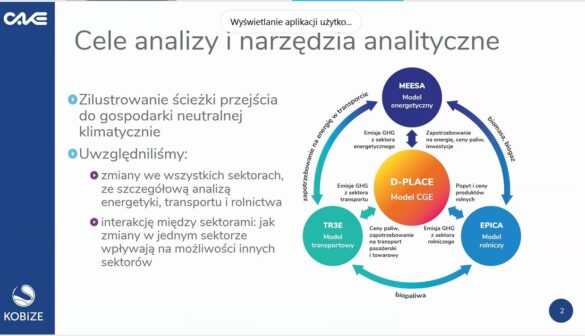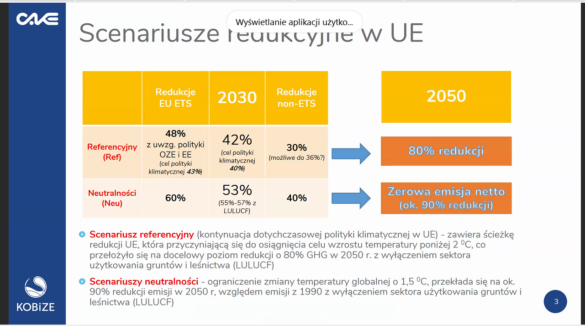The 6th meeting of the Steering Committee and the Working Group (28/05/2021) and a meeting with representatives of science, sectors, think-tanks, NGOs (01/06/2021)
Two consultation meetings on the assumptions and results of the publication “Poland net-zero 2050”: The 6th meeting of the Steering Committee and the Working Group (28/05/2021) and a meeting with representatives of science, sectors, think-tanks, NGOs (01/06/2021)
On May 28, 2021, the sixth meeting of the Steering Committee and Working Group created as part of the LIFE Climate CAKE PL project was held on-line. The meeting was attended by representatives of the administration dealing with climate and energy policy, including Ministries of: Climate and Environment, Finance, Infrastructure, Development, Labour and Technology, Agriculture and Rural Development, the Chancellery of the Prime Minister.
Moreover, on June 1, 2021, on-line workshop was held among representatives of sectors, science, think tanks and non-governmental organizations, where the adopted assumptions and the possibility of achieving neutrality by 2050 were discussed. During the debate, the CAKE team had the opportunity to confront the results with the work of other research teams and discuss the future possible development of models and analyses.
The main topic of both meetings were to present the assumptions and results of the latest analysis available in polish and summary in english:
“Poland net-zero 2050. The roadmap toward achievement of the EU climate policy goals in Poland by 2050. Summary.” – summary in english
The report shows the results for two main scenarios: Neu and Ref.
In the neutrality scenario (Neu), the total reduction of GHG emissions results from the amended EU climate policy and assumes increasing the reduction target for 2030 to 55-57% compared to 1990 emissions and achieving zero net emissions in 2050, i.e. taking into account the absorption from the LULUCF sector and with the use of GHG emission removal technology in the energy sector, i.e. biomass combustion with CCS. In the neutrality scenarios, the EU achieves approx. 90% reduction in emissions in 2050, compared to 1990 emissions without removals. This scenario contributes to the EU’s goal of the Paris Agreement to limit the global temperature change by 1.5°C.
The reference scenario (Ref) assumes the implementation of the current EU energy and climate policy. Due to large decrease in emissions in the EU ETS, where EU countries have already achieved 41% reduction in 2020 compared to 2005 emissions, in this scenario it was decided to tighten the reduction target for 2030 in the EU ETS from 43% to 48% compared to 2005. The value of the adopted target results from the increase in the share of RES and improvement of energy efficiency, which contribute to achieving higher levels of reduction than it would result from the EU ETS Directive only. In the non-ETS in 2030, the reduction level for the EU was assumed, resulting from the applicable non-ETS regulation (ESR), i.e. 30% compared to 2030. In the reference scenario in 2030, we assume a reduction in GHG emissions in all sectors to approx. 42 % from 1990 levels. After 2030, to reflect the continuity of climate policy in the EU, long-term targets are also set that would lead to a low-carbon economy in the future, but not greenhouse gas neutrality for the EU. The reference scenario includes a reduction pathway in the EU that contributes to the Paris Agreement target of temperature rise below 2°C, which translated into a target reduction of around 80% GHG in 2050 excluding the land use and forestry (LULUCF) sector.The main results are broken down into the individual analysed sectors – macroeconomic results, energy, transport, agriculture.
More about the results can be found on our website: „Polska net-zero 2050 – Mapa drogowa osiągnięcia wspólnotowych celów polityki klimatycznej dla Polski”
The most important results of the analysis are also available in the English summary:
 “Poland net-zero 2050. The roadmap toward achievement of the EU climate policy goals in Poland by 2050. Summary.” (775.7 KiB, 2,247 hits)
“Poland net-zero 2050. The roadmap toward achievement of the EU climate policy goals in Poland by 2050. Summary.” (775.7 KiB, 2,247 hits)



 Reset ustawień
Reset ustawień Kontrast
Kontrast Widok
Widok Czytelność
Czytelność Czcionka
Czcionka Znaki
Znaki Interlinia
Interlinia Słowa
Słowa Akapity
Akapity Deklaracja dostępności
Deklaracja dostępności









